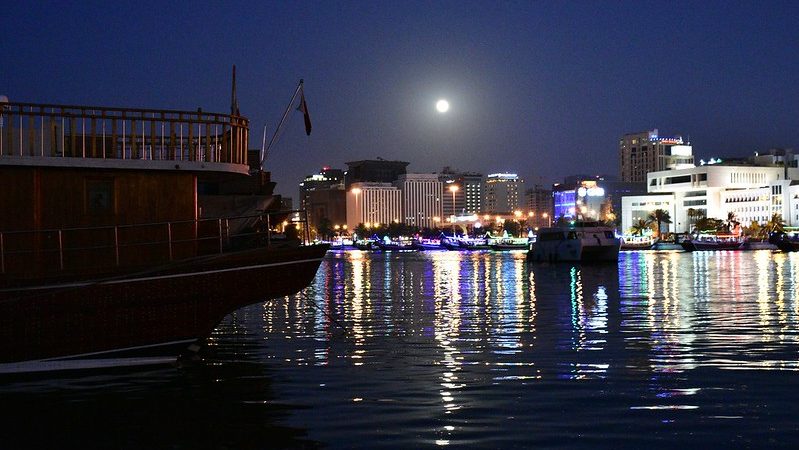Since it won the right to host the World Cup in 2010, the tiny but hugely wealthy Gulf state of Qatar has been granted £3.4bn worth of weapons sales licenses by Britain.

Described by Gary Lineker before a ball had even been kicked as the ‘most controversial World Cup in history,’ human rights abuses in Qatar are being talked about almost as much as the football.
The issues being raised and reviled make grim reading. In an assessment of Qatar’s human rights in 2021, Amnesty International explains that despite government reforms, migrant workers continued to face labour abuses, including facing sometimes ‘insurmountable bureaucratic barriers’ when seeking to change jobs without the permission of their employers.
In the past decade, the Guardian has reported a comprehensive investigation into worker deaths and abuse in Qatar. It has found that dozens of workers had died and others subjected to appalling labour abuses, including being forced to live in unsanitary and overcrowded accommodation.
Authorities have also continued to curtail freedom of expression using abusive laws to suppress critical voice. Women continue to face discrimination in law and practice. Under the nation’s guardianship system, women remain tied to their male guardian.
The rights of LGBTQI people have been one of the key criticisms surrounding human rights in Qatar. Same-sex sexual conduct between men is an offence in Qatar, punishable by up to seven years in prison.
A number of nations, including Germany and England, were planning on wearing the ‘OneLove’ rainbow armband to express diversity and inclusion, and solidarity with the LGBTQ+ community by showing football is for everyone. Controversially, FIFA has threatened to book players for wearing the OneLove armband during games at the World Cup in Qatar.
Before their tournament opener against Japan, Germany players covered their mouths during a team photo, to ‘convey the message that FIFA is silencing teams’ as coach Hansi Flick said.
Amid the controversy, newly released data shows that for arms export licenses issued by the UK for April – June 2022, Qatar was the largest recipient, in terms of the value of single licences for military exports.
On November 8, 2022, the Department for International Trade released its latest quarterly data for military and dual-use export licences issued between April – June 2022.
In its analysis of the data, the Campaign Against Arms Trade (CAAT) found that Qatar received £2.6 million, Saudi Arabia £746 million, and the United States £406 million.
“The biggest recipient of UK arms during the period was Qatar, currently hosting the World Cup, amidst outcry over the appalling death toll among migrant workers building the stadiums for the event, as well as Qatar’s criminalisation of LGBTQ people. A £2.4 billion licence was issued in May for combat aircraft and their components. The first three of 24 Eurofighter Typhoon aircraft ordered by Qatar were delivered by BAE Systems in August,” says CAAT.
Figures show that since 2010, the year Qatar won the right to host the World Cup, the UK has licenced £3.4 billion worth of lethal weaponry to the Qatari regime forces. Reports contend that there was approval for licenses to export ammunition, bombs, machine guns, helicopters, tanks, assault rifles, riot shields and weapon sights from the UK to Qatar.
The Scottish Greens said the figures show the UK government was “complicit in the human rights abuses of which Qatar has been accused”, including those against LGBT+ communities, women and migrants who built the football stadiums.
Ross Greer MSP and external affairs spokesperson for the Scottish Greens said: “The World Cup has given the Qatari dictatorship a huge propaganda platform. But it has also put their appalling human rights record under the microscope like never before.”
“One reason why the regime has been able to inflict the atrocities and abuses that it has against LGBT+ people, women, migrant workers and others is because of the vast international support it has received from complicit governments like the one in Westminster.
“These abuses have been happening for years, and Downing Street has armed and supported the regime every step of the way. Every time the UK government approves an arms sale it is complicit in the suffering of ordinary people in Qatar.
“It is also sending a loud and clear message that the rights of Qatari people and human rights defenders don’t matter, that their lives are less important than arms company profits.”
“The UK Government must halt these sales and end its support of a regime with such a horrendous record of human rights abuses. To do otherwise is to be knowingly complicit in the oppression and violence,” Greer continued.
In an op-ed about Britain’s relationship with Qatar, Guardian columnist Nesrine Malik notes how Qatar, and other wealthy undemocratic regimes around the world, are empowered in Britain, and by extension on the global stage, by a “parliamentary system open to lobbying, a lucrative weapons industry, and a real-estate economy that is geared to a global wealthy elite.”
Left Foot Forward reached out to the Department for International Trade for commentary on its licensing of weapons sales to Qatar. A UK government spokesperson said:
“The UK is a leading advocate for human rights around the world and we remain committed to the promotion of universal human rights.
“We take our export control responsibilities seriously and operates one of the most robust and transparent export control regimes in the world.
“We consider all our export applications thoroughly against a strict risk assessment framework and keep all licences under careful and continual review as standard.”
Gabrielle Pickard-Whitehead is a contributing editor to Left Foot Forward
Image credit: Creative Commons – Alvin Puthur
To reach hundreds of thousands of new readers we need to grow our donor base substantially.
That's why in 2024, we are seeking to generate 150 additional regular donors to support Left Foot Forward's work.
We still need another 117 people to donate to hit the target. You can help. Donate today.



